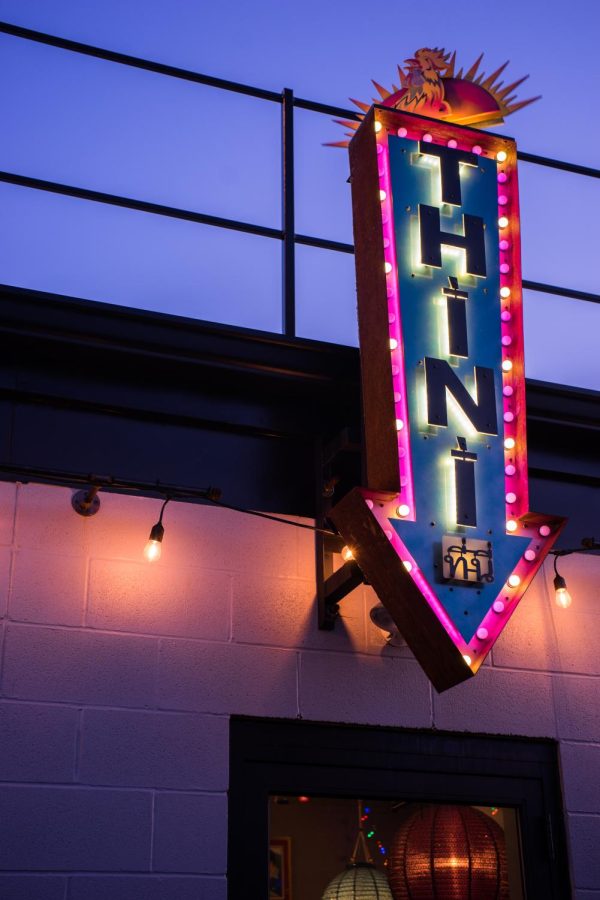Local Businesses Navigate Changing Economic Conditions
ThiNi Thai plans to open its new expanded space by the end of June.
As the Omicron wave loosens its grip on Northern Ohio, downtown Oberlin businesses navigate yet another stage in the pandemic despite ongoing supply chain and labor shortage issues. ThiNi Thai is expanding its kitchen and seating area, and Golden Hour Acupuncture is reopening in a new space.
ThiNi’s expansion — which will likely cost over $100,000 — began this January with the goal of creating more efficiency in a small space.
“Our kitchen is about maybe 200 square feet,” said Jason Adelman, co-owner of both ThiNi Thai and The Feve. “It’s extremely small considering the [work] that we’re doing, so a lot of things are stored at the Feve. … Labor is expensive and we’re wasting hours and hours every day, people walking it back and forth. It’s physically draining, mentally draining on them. It’s not fun. It’s raining, snowing, whatever, and they’ve gotta walk across the street to go get eggs.”
Additionally, the larger kitchen will allow more cooks to work at one time, meaning available prep time will increase and, hopefully, the restaurant will be able to open for lunch.
“We’re hitting our capacity of how much food we can actually prepare, we just physically do not have the room for food that we’ve prepped, nor do we have the cooking facilities to prepare any more,” he said. “Like on [Parents and Family] weekend, we were like, ‘We literally cannot cook more food.’ We had to stop taking tables and we had to stop taking carry-out at 6:30. We were booked out. I never experienced that before in 20 years at The Feve.”
Adelman is also excited to serve more curries and authentic Thai barbecue with an indoor charcoal grill once the expansion is complete. He hopes to open the new wing of the restaurant by summertime.
Golden Hour Acupuncture, which opened in February 2021 on West College Street, also expanded recently, relocating to a larger space on South Main Street.
“The space that I was in before was awesome — it was really good for visibility and getting started, and … it was really nice having a storefront,” said Marikate Workman, owner and acupuncturist of Golden Hour. “But, that space also had just privacy concerns. Just being right on the street like that and not having enough separation basically from people just popping in to say ‘hi’ or ask questions and then people receiving treatment in the back.”
Workman did not originally plan to open a business, but after doing house calls throughout the pandemic, she realized she wanted to rent a space for her practice. She hopes that someday, when COVID-19 concerns are minimal, she can provide group-setting community acupuncture.
“Especially here in Ohio, there’s not great insurance coverage for acupuncture,” Workman explained. “It ends up just being costly for people if they’re trying to manage pain or manage anxiety. So the goal of group- setting treatments is to offer sliding scale fees. … The thing that makes sliding scale sustainable is seeing multiple people at a time, but because of just ongoing COVID [concerns] and new variants and whatever, I still have not been doing group-setting stuff.”
While business has been up for many storefronts in town, some are still experiencing supply chain and labor shortage issues they were facing several months ago.
“It’s inching to better but just not there yet,” said Janet Haar, executive director of the Oberlin Business Partnership. “I do believe that later this spring and summer — especially if COVID holds off — I think that we’re going to see more of what we might consider normal.”
For Adelman, these issues — both supply chain and labor costs — have been a puzzle to navigate.
“We’re having an issue [at] The Feve with tater tots right now,” he said. “It’s just the whole world is kind of flipped upside down. We’re having an issue with the cost of charcoal, fish sauce — any of the sauces coming from Asia, like oyster sauce, fish sauce, [and] soy, [are] three to four times more expensive now in terms of shipping.”
For Lorraine Morrison, one of the owners of Carlyle Gift and Flower Shop, reflecting on the past two years of the pandemic has helped her realize how much it brought the community together. At the beginning of the pandemic, she said it seemed to her that customers needed social interaction when they came into the store.
“For example, if a 90-year-old woman said to me, ‘What I really want is a fish dinner,’ we’d get her a fish dinner,” Morrison said. “So we were able to respond to the community as we heard about things and that’s extremely gratifying. We also, for the past two years, were able to have people from the community who have been very supportive. They supported us because they wanted to see us succeed.”
However, not all businesses are staying afloat. Both Catrinas and The Oberlin Market have closed in the past few months.
“It’s hard to say,” Haar said. “There are some people really high at the top and some people really low at the bottom. … I think some of our businesses are doing okay. But some of them are still struggling.”





